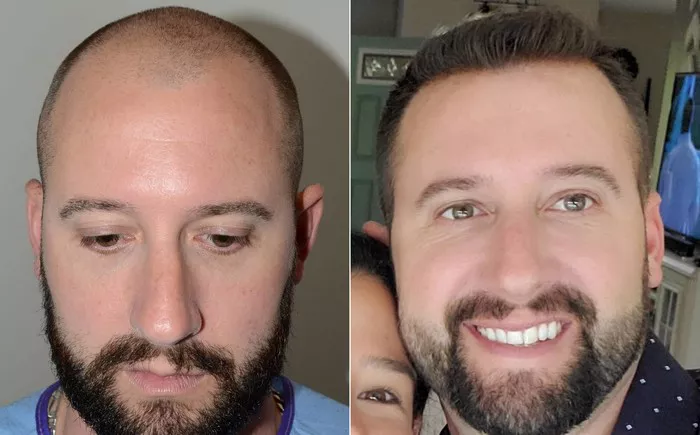When it comes to regaining a full head of hair and bidding farewell to the days of balding, hair transplants have been a game-changer. But, as with any medical procedure, there are still questions and concerns that need addressing. One such question that often arises is, “Can you still go bald after a hair transplant?” In this comprehensive article, we will delve into the world of hair transplants and explore the factors that can influence the longevity of your newly transplanted locks.
What is the hair transplant?
A hair transplant is a surgical procedure that involves the relocation of hair follicles from a donor area, typically the back or sides of the head, to areas experiencing hair loss or thinning. It is a highly effective method for restoring hair and addressing male pattern baldness or other forms of hair loss. There are two primary techniques used in hair transplants: Follicular Unit Extraction (FUE) and Follicular Unit Transplantation (FUT). FUE involves the extraction of individual follicles, while FUT removes a strip of tissue containing follicles. These follicles are then carefully implanted into the recipient site, promoting natural hair growth over time.
What are the chances of a hair transplant being successful?
The success of a hair transplant varies depending on multiple factors. In general, when performed by an experienced surgeon on a suitable candidate with stable donor hair, the success rate is high. Typically, more than 90% of transplanted hair follicles survive, resulting in natural hair growth. However, individual results may vary, influenced by factors like the surgeon’s skill, technique used (FUT or FUE), graft quality, post-operative care, and patient compliance. Realistic expectations are crucial, as a hair transplant can significantly improve appearance, but it may not fully restore original density or hairlines. A thorough consultation with a skilled surgeon helps determine expected outcomes.
Factors Influencing Hair Transplant Success
The success of a hair transplant procedure can be influenced by several factors, both before and after the surgery. A successful hair transplant typically results in natural-looking, long-lasting hair growth. Here are some key factors that can influence the success of a hair transplant:
1. Hair Loss Pattern:
The extent and pattern of hair loss can impact the success of the transplant. Patients with well-defined, stable areas of donor hair typically have better results.
2. Surgeon’s Experience:
The skill and experience of the surgeon performing the procedure are critical. A skilled and experienced surgeon is more likely to achieve natural-looking results with minimal complications.
3. Technique:
Two common hair transplant techniques are Follicular Unit Transplantation (FUT) and Follicular Unit Extraction (FUE). The choice of technique depends on the patient’s individual characteristics and the surgeon’s preference. FUE is less invasive and leaves minimal scarring, but FUT may be more suitable for certain cases.
4. Quality of Donor Hair:
The quality and density of the donor hair affect the outcome. Coarse, thick hair generally provides better coverage and results than fine hair.
5. Graft Survival:
Proper handling and storage of hair grafts are essential to ensure their viability. Grafts should be harvested, stored, and transplanted carefully to minimize trauma and maximize survival.
Can You Still Go Bald After a Hair Transplant?
It’s possible to continue experiencing hair loss even after a hair transplant. While transplanted hair is typically permanent and not subject to the same pattern of genetic hair loss as the recipient area, the native hair surrounding the transplant may continue to thin or fall out over time. To maintain a natural appearance and uniform coverage, some patients may require follow-up procedures to address ongoing hair loss. Additionally, factors like age, genetics, and hormonal changes can still contribute to balding in non-transplanted areas. Regular follow-ups with a hair transplant specialist and potential medical treatments can help manage ongoing hair loss.
Post-Transplant Care
Proper post-transplant care is crucial for maintaining the health and longevity of your transplanted hair. Following the surgeon’s instructions, such as avoiding excessive sun exposure, refraining from vigorous physical activity, and using prescribed medications, can significantly improve the outcome.
1. Medications:
Finasteride and minoxidil are commonly prescribed to prevent further hair loss and promote hair growth.
2. Regular Check-ups:
Scheduled follow-up appointments with your surgeon allow them to monitor your progress and make any necessary adjustments.
See Also: The Ideal Number of Hair Follicles for Hair Transplant
Addressing the Balding Concern
While a successful hair transplant can provide you with a head full of hair, it’s essential to understand that the procedure doesn’t make you immune to future hair loss. Here are some points to consider:
1. Natural Hair Aging
Hair aging is a natural process that affects everyone, regardless of whether they’ve had a hair transplant. Over time, hair may become thinner, lose its vibrancy, and show signs of graying. While a hair transplant can restore a youthful appearance, it does not stop the natural aging of your hair.
2. Progression of Hair Loss
If your underlying genetic predisposition to hair loss continues, it’s possible that you may experience hair thinning in areas not addressed by the transplant. However, the transplanted hair is generally more resilient to the effects of male pattern baldness.
3. Maintenance is Key
To ensure your hair transplant remains successful over the long term, diligent maintenance is crucial. This includes using prescribed medications, following a proper hair care routine, and seeking professional advice if you notice any changes in your hair.
Conclusion
In summary, while a hair transplant can provide remarkable results in restoring your hairline and confidence, it does not make you entirely immune to future hair loss. Factors such as the quality of donor hair, the timing of the procedure, and post-transplant care all play significant roles in the success and longevity of your transplanted hair. To maintain your newfound locks, consult with a skilled hair transplant specialist, adhere to their recommendations, and be proactive in managing any future hair loss. Remember, a well-informed approach is your best defense against the uncertainty of balding, even after a hair transplant.


